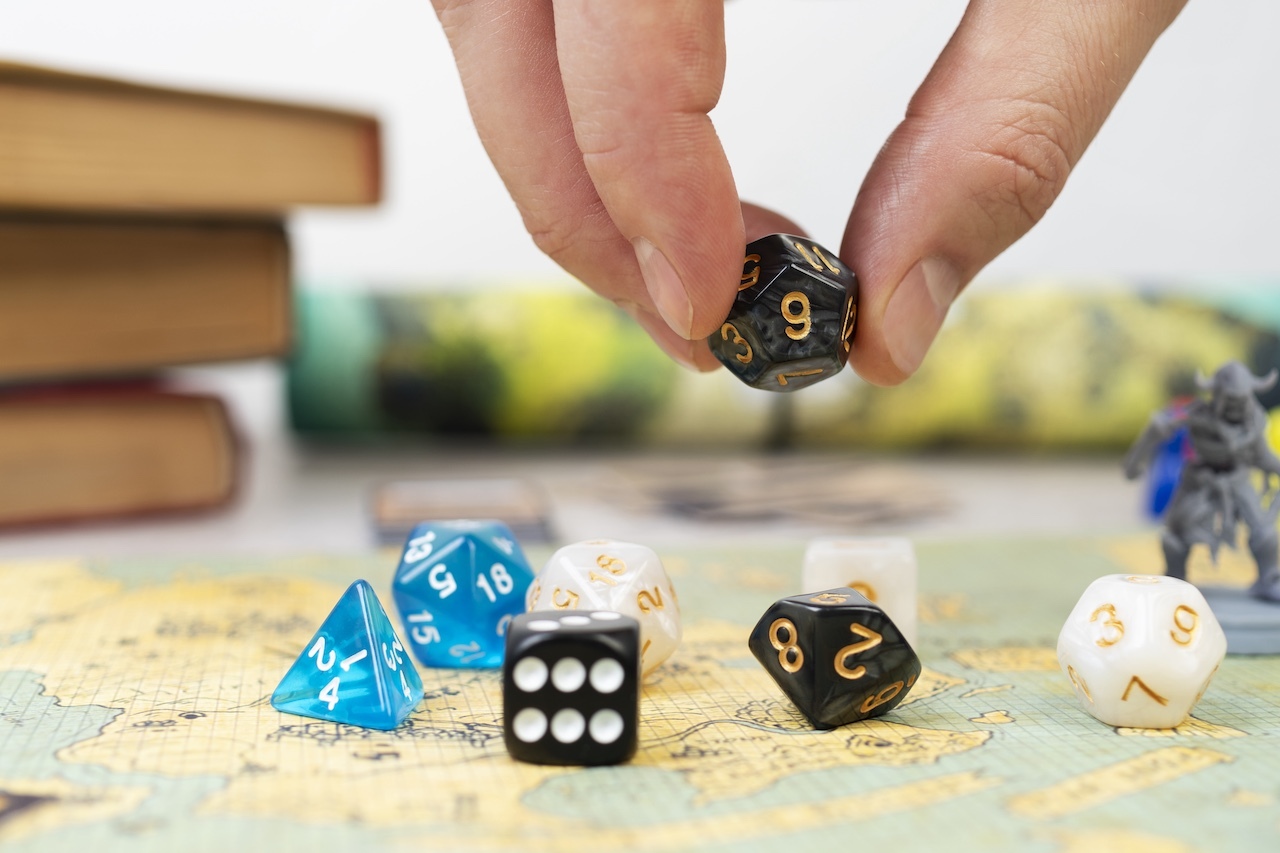1599 Geneva Bible (GNV)
The Geneva Bible: A Cornerstone of English Protestantism A Testament to Reform The 1599 Geneva Bible... Read More

Gambling sparks debate. Some see it as entertainment; others see moral risks. Is gambling a sin? The Bible doesn’t give a clear answer, but history offers clues. Poker, dice, and other games of chance trace back to ancient times. The Bible mentions casting lots—an early form of randomness used to settle disputes or seek divine will. Surprisingly, modern gambling reflects these ancient practices. The thrill of uncertainty remains unchanged. But intent matters. Is it for fun or fueled by greed? Understanding gambling’s biblical roots helps us see its role in human culture and how chance shapes decisions.
Biblical Gambling and The Role of Lots in the Scriptures
Ancient societies relied on lots—a practice much like rolling dice or drawing straws. It wasn’t gambling as we know it, but a way to seek fairness, resolve disputes, and even discern divine will. The Israelites cast lots to divide land, ensuring no human bias influenced the outcome. Proverbs 16:33 states, “The lot is cast into the lap, but its every decision is from the Lord.” Chance, in their eyes, wasn’t random; it reflected divine control. The New Testament continued this tradition. The disciples cast lots to replace Judas—not for gain, but to seek God’s will. Unlike modern gambling, driven by risk and reward, biblical lots reflected faith, surrendering human choice to divine guidance. It wasn’t about risk or greed but about surrendering outcomes to a higher power. Today, poker and dice games echo this ancient reliance on chance. The mechanics have changed, but the principle remains: luck plays a role, yet intentions shape its meaning. Is it faith or fortune? That question still lingers.

Dice, Poker, and the Evolution of Lot-Based Games
Biblical lots and modern games share a clear link. Though poker didn’t exist in ancient times, games of chance did. Dice, widely used in early civilizations, still play a role today. Ancient people cast lots to make decisions, much like rolling dice now determines outcomes. Over time, chance-based games evolved, shifting from divine guidance to entertainment and gambling. What once settled disputes now fuels excitement, risk, and strategy. The essence remains—uncertainty shapes fate.
Playing poker blends skill with luck. A player strategizes, reads opponents, and calculates odds, yet every hand hinges on chance. The deal, the flop, the river—uncertainty drives the game. Ancient casting of lots followed the same principle. People sought divine intervention through randomness, much like modern gamblers chase fortune. Though motivations differ, the reliance on unpredictable outcomes remains unchanged. As poker grew, chance remained its backbone. Even today, uncertainty fuels the thrill. The gambling industry adapted, implementing innovations in the form of shares, the 200% casino bonus, reshaping how players engage. With a 200% deposit bonus, gamblers start with triple their investment. This boost enhances gameplay, mirroring the ancient belief that fate, or in this case, bonuses, could influence success. Casino deposit bonuses allow extended play, increasing the odds of a favorable outcome. Though gambling has evolved—shifting from sacred lots to sophisticated games—the core remains: chance dictates outcomes. Whether rolling dice in biblical times or chasing a jackpot today, luck continues to shape fortunes.
Is Gambling a Sin? The Theological Perspective
Is gambling a sin? The Bible does not give a direct answer but warns against greed and the love of money. It emphasizes that wealth gained at the expense of others is dangerous.1 Timothy 6:10 states, “For the love of money is the root of all evil.” This suggests the problem isn’t gambling itself, but the desire for wealth. Games like poker mix skill and luck. They are not sinful by nature. However, gambling can become harmful when:
A responsible approach to gambling aligns better with biblical principles. Balance and self-control matter.
The God of Gambling: Divine Control Over Luck

When luck turns sour, gamblers often invoke the "God of gambling." But does a divine force truly shape the roll of dice or the turn of a card? Biblically, God governs all things—even chance. In ancient times, casting lots wasn’t just about randomness; it was about trust. People sought divine will through uncertainty, surrendering control. This belief lingers. Whether at a poker table or a roulette wheel, some still see fate as guided by something greater. Chance feels unpredictable, yet for those with faith, it’s never random. Perhaps luck is less about fortune and more about perspective.
Conclusion: Embracing Chance with Responsibility
For centuries, people have turned to chance—whether casting lots or shuffling cards. The Bible’s use of lots wasn’t about luck but divine decision-making. Yet, the essence of unpredictability lingers. Poker, dice, and other games thrive on uncertainty. Players chase the thrill, much like those in ancient times seeking fate’s decree. But does gambling cross a moral line? The Bible doesn’t outright condemn it. Instead, it warns against greed, obsession, and reckless pursuit of wealth. When played responsibly, gambling remains entertainment. The danger arises when desire overtakes control, leading to ruin. Just as lots once determined land or leadership, modern games rely on chance. But faith, not fortune, should guide choices—win or lose, trust remains in God.
The Geneva Bible: A Cornerstone of English Protestantism A Testament to Reform The 1599 Geneva Bible... Read More
The 21st Century King James Version (KJ21): A Modern Approach to a Classic Text A Balancing Act The ... Read More
The American Standard Version (ASV): A Cornerstone of Modern English Bibles A Product of Scholarly R... Read More
The Amplified Bible (AMP): A Rich and Comprehensive Translation The Amplified Bible (AMP) stands out... Read More
The Amplified Bible, Classic Edition (AMPC): A Timeless Treasure The Amplified Bible, Classic Editio... Read More
The Authorized (King James) Version (AKJV): A Timeless Classic The Authorized King James Version (AK... Read More
The BRG Bible: A Colorful Approach to Scripture A Unique Visual Experience The BRG Bible, an acronym... Read More
The Christian Standard Bible (CSB): A Balance of Accuracy and Readability The Christian Standard Bib... Read More
The Common English Bible (CEB): A Translation for Everyone The Common English Bible (CEB) is a conte... Read More
The Complete Jewish Bible (CJB): A Jewish Perspective on Scripture The Complete Jewish Bible (CJB) i... Read More
The Contemporary English Version (CEV): A Bible for Everyone The Contemporary English Version (CEV),... Read More
The Darby Translation: A Literal Approach to Scripture The Darby Translation, often referred to as t... Read More
The Disciples' Literal New Testament (DLNT): A Window into the Apostolic Mind The Disciples’ Literal... Read More
The Douay-Rheims 1899 American Edition (DRA): A Cornerstone of English Catholicism The Douay-Rheims ... Read More
The Easy-to-Read Version (ERV): A Bible for Everyone The Easy-to-Read Version (ERV) is a modern Engl... Read More
The English Standard Version (ESV): A Modern Classic The English Standard Version (ESV) is a contemp... Read More
The English Standard Version Anglicised (ESVUK): A British Accent on Scripture The English Standard ... Read More
The Evangelical Heritage Version (EHV): A Lutheran Perspective The Evangelical Heritage Version (EHV... Read More
The Expanded Bible (EXB): A Study Bible in Text Form The Expanded Bible (EXB) is a unique translatio... Read More
GOD'S WORD Translation (GW): A Modern Approach to Scripture The GOD'S WORD Translation (GW) is a con... Read More
The Good News Translation (GNT): A Bible for Everyone The Good News Translation (GNT), formerly know... Read More
The Holman Christian Standard Bible (HCSB): A Balance of Accuracy and Readability The Holman Christi... Read More
The International Children's Bible (ICB): A Gateway to Faith The International Children's Bible (ICB... Read More
The International Standard Version (ISV): A Modern Approach to Scripture The International Standard ... Read More
The J.B. Phillips New Testament: A Modern Classic The J.B. Phillips New Testament, often referred to... Read More
The Jubilee Bible 2000 (JUB): A Unique Approach to Translation The Jubilee Bible 2000 (JUB) is a dis... Read More
The King James Version (KJV): A Timeless Classic The King James Version (KJV), also known as the Aut... Read More
The Lexham English Bible (LEB): A Transparent Approach to Translation The Lexham English Bible (LEB)... Read More
The Living Bible (TLB): A Paraphrase for Modern Readers The Living Bible (TLB) is a unique rendering... Read More
The Modern English Version (MEV): A Contemporary Take on Tradition The Modern English Version (MEV) ... Read More
The Mounce Reverse Interlinear New Testament: A Bridge to the Greek The Mounce Reverse Interlinear N... Read More
The Names of God Bible (NOG): A Unique Approach to Scripture The Names of God Bible (NOG) is a disti... Read More
The New American Bible, Revised Edition (NABRE): A Cornerstone of English Catholicism The New Americ... Read More
The New American Standard Bible (NASB): A Cornerstone of Literal Translations The New American Stand... Read More
The New American Standard Bible 1995 (NASB1995): A Refined Classic The New American Standard Bible 1... Read More
The New Catholic Bible (NCB): A Modern Translation for a New Generation The New Catholic Bible (NCB)... Read More
The New Century Version (NCV): A Bible for Everyone The New Century Version (NCV) is an English tran... Read More
The New English Translation (NET): A Transparent Approach to Scripture The New English Translation (... Read More
The New International Reader's Version (NIRV): A Bible for Everyone The New International Reader's V... Read More
The New International Version - UK (NIVUK): A British Accent on Scripture The New International Vers... Read More
The New International Version (NIV): A Modern Classic The New International Version (NIV) is one of ... Read More
The New King James Version (NKJV): A Modern Update of a Classic The New King James Version (NKJV) is... Read More
The New Life Version (NLV): A Bible for All The New Life Version (NLV) is a unique English translati... Read More
The New Living Translation (NLT): A Modern Approach to Scripture The New Living Translation (NLT) is... Read More
The New Matthew Bible (NMB): A Reformation Revival The New Matthew Bible (NMB) is a unique project t... Read More
The New Revised Standard Version (NRSV): A Modern Classic The New Revised Standard Version (NRSV) is... Read More
The New Revised Standard Version Catholic Edition (NRSVCE): A Cornerstone of Modern Catholicism The ... Read More
The New Revised Standard Version, Anglicised (NRSVA): A British Accent on Scripture The New Revised ... Read More
The New Revised Standard Version, Anglicised Catholic Edition (NRSVACE): A Bridge Between Tradition ... Read More
The New Testament for Everyone (NTE): A Fresh Perspective The New Testament for Everyone (NTE) is a ... Read More
The Orthodox Jewish Bible (OJB): A Unique Perspective The Orthodox Jewish Bible (OJB) is a distincti... Read More
The Revised Geneva Translation (RGT): A Return to the Roots The Revised Geneva Translation (RGT) is ... Read More
The Revised Standard Version (RSV): A Cornerstone of Modern English Bibles The Revised Standard Vers... Read More
The Revised Standard Version Catholic Edition (RSVCE): A Cornerstone of English Catholicism The Revi... Read More
The Message (MSG): A Contemporary Paraphrase The Message, often abbreviated as MSG, is a contemporar... Read More
The Voice: A Fresh Perspective on Scripture The Voice is a contemporary English translation of the B... Read More
The Tree of Life Version (TLV): A Messianic Jewish Perspective The Tree of Life Version (TLV) is a u... Read More
The World English Bible (WEB): A Modern Update on a Classic The World English Bible (WEB) is a conte... Read More
The Worldwide English (WE) New Testament: A Modern Take on a Classic The Worldwide English (WE) New ... Read More
The Wycliffe Bible: A Cornerstone of English Scripture A Revolutionary Translation The Wycliffe Bibl... Read More
Young's Literal Translation (YLT): A Literal Approach to Scripture Young's Literal Translation (YLT)... Read More
For enthusiastic readers, managing a collection of books can become challenging. An expanding "to be... Read More
Deuteronomy 18 - "And if you say in your heart, 'How shall we know the word which the LORD has not ... Read More
John 14:26 - "But the Counselor, the Holy Spirit, whom the Father will send in my name, he will teac... Read More
(Enlarge) (PDF for Print) Map of the Origin of Nations and Races that were dispersed by God in Gene... Read More
The Journeys of Abraham (Enlarge) (PDF for Print) - Map of Abraham's Journey with Trade Routes Map ... Read More
(Enlarge) (PDF for Print) Map of the Route of the Hebrews from Egypt This map shows the Exodus of t... Read More
Mark 6:52 - For they considered not the miracle of the loaves: for their heart was hardened. God did... Read More
also see:The Encampment of the Children of IsraelThe Children of Israel on the March THE OUTER COURT... Read More
2 Chronicles 36:23 - Thus saith Cyrus king of Persia, All the kingdoms of the earth hath the LORD Go... Read More
All Bible Maps - Complete and growing list of Bible History Online Bible Maps. Old Testament Maps T... Read More
The Bible portrays marriage as a lifelong bond built on love, faith, and commitment, reflecting God'... Read More
Ancient Manners and Customs, Daily Life, Cultures, Bible Lands NINEVEH was the famous capital of an... Read More
Distances From Jerusalem to: Bethany - 2 milesBethlehem - 6 milesBethphage - 1 mileCaesarea - 57 m... Read More
Dagon was the god of the Philistines. This image shows that the idol was represented in the combina... Read More
Map of Israel in the Time of Jesus (Enlarge) (PDF for Print) Map of First Century Israel with Roads... Read More
The Table of Shewbread (Ex 25:23-30) It was also called the Table of the Presence. Now we will pas... Read More
see also:The PriestThe Consecration of the PriestsThe Priestly Garments The Priestly Garments 'The ... Read More
Introduction to the Book of Daniel in the Bible Daniel 6:15-16 - Then these men assembled unto the k... Read More
The Golden Lampstand was hammered from one piece of gold. Exod 25:31-40 "You shall also make a lam... Read More
The Golden Altar of Incense (Ex 30:1-10) The Golden Altar of Incense was 2 cubits tall.It was 1 cub... Read More
Ancient Tax Collector Illustration of a Tax Collector collecting taxes Tax collectors were very des... Read More
also see: Blood Atonement and The Priests The Five Levitical Offerings The Sacrifices The sacrificia... Read More
Genesis 10:32 - These are the families of the sons of Noah, after their generations, in their nation... Read More
Illustration of Jesus Reading from the Book of Isaiah This sketch contains a colored illustration o... Read More
"But the angel said unto him, Fear not, Zacharias: for thy prayer is heard; and thy wife Elisabeth s... Read More
also see: The Encampment of the Children of IsraelThe Children of Israel on the March The brazen a... Read More
In a rapidly evolving world shaped by both timeless values and groundbreaking technology, individual... Read More
Rome, the Eternal City, has stood as a symbol of history, culture, and religion for over two millenn... Read More
Many teachers assign pieces titled “an essay about god in my life.” The title invites calm thought a... Read More
Exploring identity has become part of the digital life. Social media, streaming, and gaming give you... Read More
Unearth the rich tapestry of biblical history with our extensive collection of over 1000 meticulously curated Bible Maps and Images. Enhance your understanding of scripture and embark on a journey through the lands and events of the Bible.
Start Your Journey Today!
